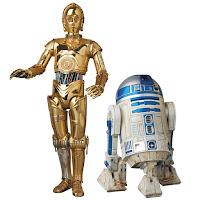Week 3 Blog
http://junaduncan.tumblr.com/post/6141963196/domo-arigato-mr-roboto-domo-arigato-means-thank
This week’s lessons and lectures focused on industrialization and robotics. What I found interesting when professor talked about robotics was how she said that artists were the first to envision the robot. The idea of the robot first came out of the theatre during the second industrial revolution as a response to mechanism and labor. When I think of a robot my first thought does not jump to the theatre. I instead imagine a scientific lab or Star Wars. It was interesting to see that the conception the robot has theatrical roots instead of mathematical ones. The mechanisms of a robot itself may be linked to math and science but it would not have come into existence without theatre and the arts.
Another key topic from this week was German Jewish philosopher and literary critic Walter Benjamin. He wrote a widely renown essay titled “Art in the Age of Mechanical Reproduction”. This essay had such an influence on society because during the time of its release political issues were entering the world of art. Benjamin argued that mechanical reproduction put an end to uniqueness and authenticity. With this increase of mass production the idea of the original and tradition ceases.
http://thefwoosh.com/2015/08/medicom-mafex-star-wars-c-3po-and-r2-d2
Benjamin made some points that reminded me of the “Changing Education Paradigms” Youtube video from week 1 of this class. This video explained how education nowadays is based on standardization and how children are put through the education systems like batches of a product. We live in a society of mass production which is in many ways great. Products can be made quicker, more efficiently and cost less. However we also see the repercussions of this. Human culture has become one of instant gratification and unoriginality. We want what is quick and easy and we don’t want to put any thought into it. We need mass production to support our economy and create goods that are vital to human survival but we also need to foster originality and tradition. It is imperative that society finds a way to reap the benefits of mass production while enhancing the human’s natural creative abilities. If a balance between these two aspects of life is not found humans would lack what made them human in the first place: creative thinking.
http://www.samael.org/idiomas/ingles/paginas/2_compendio_doctrinario/4-parametros_educacionales/8_Psychological%20rebellion%20.htm
Works Cited:
"Electric Circus Dresseur Der Automaten." Electric Circus Dresseur Der Automaten. Web. 16 Apr. 2016. http://www.electric-circus.eu
"Gijs Van Bon." Gijs Van Bon. Web. 17 Apr. 2016. http://www.gijsvanbon.nl
"My Seven Species of Robot -- and How We Created Them." Dennis Hong:. Web. 17 Apr. 2016. http://www.ted.com/talks/dennis_hong_my_seven_species_of_robot
"Relating the Rapidly Changing Present to the Distant Past as Far as Book History Is Concerned." Relating the Rapidly Changing Present to the Distant Past as Far as Book History Is Concerned. Web. 17 Apr. 2016. http://www.historyofinformation.com/narrative/index.php
“Robots Will Invade Our Lives." Rodney Brooks:. Web. 16 Apr. 2016. http://www.ted.com/talks/rodney_brooks_on_robots#t-396635



I found your emphasis on the relation of theater and robotics in this post very interesting. Being a star wars fan myself, I too couldn't help but think of C3PO when Professor Vesna brought up the concept of cyborgs and robots origination in theater and film. I also thought your analysis of both the good and bad effects of mass production and society were insightful.
ReplyDelete